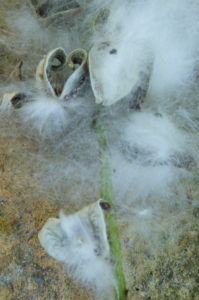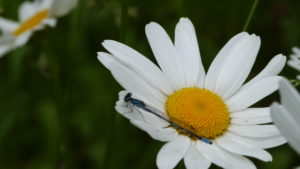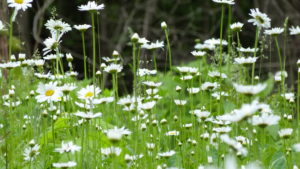
Creation balanced with rest is the pattern that has been taken to extremes within your world. You think of birth as creation and death as rest. You do not realize that your nature, and the nature of your life, like that of all around you, is governed by seasons natural to the state of love, seasons of regeneration. T4:4.2
There is such a rhythm to nature. If I kept track of such things in a manner more sufficient than my memory, I’d remember that the lavender bushes bud first, and then the fruit trees. Next, the cottonwoods shed their fluff, and then the peonies and daisies begin to bloom, and the dragonflies appear, and then…full summer has arrived. This is the moment in which I found myself walking through the neighborhood last night … aware of the full arrival.
I walk with my camera always. “I never know what I’m going to see,” is the reason. Something about this seems to sum up my attitude toward life.
Even though there will be plenty to photograph all summer, I have this feeling about summer. Now it is here, and my “feeling” is that despite all the growth of the various flowers and the tomato plants and the buds that will become fruit, it will simply be “summer” until fall arrives. And then fall, the whole of it, like the whole of spring, (my two favorite seasons) will feel again like constant change on a different scale. It makes no sense to feel this way, yet I do, and I allow this peculiarity. It is a “usualness” I feel about summer—everything is “the usual” green, everything is blossoming (like usual), everything is enlarging (and so on)! The light feels more steady and less magical as well, and soon I begin to long for change.
We people have our seasons too! Often I find mine reflected in the books I’m reading.
Recently I felt a yen to return to my old friend, Merton. The first book that I saw when I went looking for one of his on my shelves, was a compilation of his journals from the years titled, “Turning Toward the World.” I did not choose it for the title and yet I soon wondered if it had some significance—if it was one of those instances of the book finding me.
Just as I know I’ve stood at this moment of summer before, I know I’ve felt this sense of “turning toward the world” before. The difference now—thankfully, is that I can see, that this, too, can be a “season” and so not hold the scariness it did when I wondered if once I turned toward the world, I would not be able to return to solitude.
Merton’s journals, in their titles, tell of his various seasons:
Book 1: Run to the Mountain: The Story of a Vocation (1939-41)
Book 2: Entering the Silence: Becoming a Monk and a Writer (1941-52)
Book 3: A Search for Solitude (1952-60)
Book 4: Turning Toward the World: The Pivotal Years (1960-63)
Book 5: Dancing in the Water of Life (1963-65)
Book 6: Learning to Love: Exploring Solitude and Freedom (1966-67)
Book 7: The Other Side of the Mountain: The End of the Journey (1967-68)
What would you and I name our seasons? Wouldn’t it be a wonderful exercise?
In 1960, just realizing that he has reached a point where he has acquired the power to be heard, Merton asks himself, “Who am I?”
He answers: “A priest and a writer, and one who has the gift of speaking intelligently I hope. Hence I must also think clearly, and pray and meditate and when circumstances require it, speak. And speak to as many as will listen to me. About things concerning their happiness and their destiny—along with my own. In a word, about salvation.”
How many of us don’t ask ourselves, “Who am I?” Who am I to have something to say, something to give, something to contribute?
And yet, in ACOL we are assured repeatedly how much we each matter. In another quote from “A Treatise on the New” we hear:
To sustain Christ-consciousness in form is creation of the new. My one example life could not sustain Christ-consciousness for those who came after me but could only be an example. What you are called to do is to, through your multitude, sustain Christ-consciousness, and thus create the union of the human and the divine as a new state of being. (T4:4.18)
How wonderful it is to accept our true Selves (the elevation that allows the in-forming of our divinity), to accept our seasons, to accept a new state of being.
Solitude and vocation and writing would surely be among my seasons, but I feel my current and hopefully coming season will emphasize dialogue. I am so excited to be experiencing dialogues more widely and to feel in movement with it.
will emphasize dialogue. I am so excited to be experiencing dialogues more widely and to feel in movement with it.
Dialogue is a way for each of us to answer the Who am I question boldly (and safely), with each other, in unity and relationship. We enter dialogue in a form so loosely held, that in its loosely held moments, and with our heart-felt yearning to be and to share who we are . . . we do.
What seasons are passing for you? And which are coming?


Dear Mari, Thank you for your beautiful blog and the questions you posed at the end. I am discovering that each day is a new season, each moment of coming to Be something new. The Prescence of the Divine Mother of Yeshua and Christ-consciousness, from who’s darkness all Life emerges, Is The Continual Coming to Be and passing away. Change is no longer a fearful thing, but an on-going intentional surrender to wisdom, comfort, ferrocious compassion, companionship and change.I am so grateful for the Grace of The Divine Mother’s Prescence joining Yeshua’s in my heart. Yeshua’s Prescence, now joined by The Queen of Heaven’s is an experience of Union…well, no words, just humbled and awed reverence. Profound gratitude to God for you. Love, Mary
Hi Mary, I like your sense of the constancy of the coming of the new, and also of the Divine Mother’s presence, as you say. This sense has been with me too, coming on stronger year after year. In ACOL’s language, I feel it represents the birthing of the new. This is our time to do just that! Thank you for sharing and for being part of the birth!
Dear Marie, thank you for your beautiful blog and the questions you posed at the end. I am discovering that each day is a new season, each moment of “coming to Be” something new. The Presence of The Divine Mother, mother of Yeshua, and Christ-Consciousness from whose darkness all Life emerges Is the continuous coming to Be and passing away. Change is no longer a fearful thing but an on-going intentional surrender to compassion, comfort, change (death), and the Wisdom inherent in the never ending Creation that is God: from age to age, from eon to eon. I am so grateful for the emerging awareness of The Divine Mother in my life, knowing that She is the constant companion of Christ-Conscious. As I have a palpable, on-going sense of Yeshua’s Prescence, it now has been joined by the Divine Mother. No words can express. My gratitude and blessings from our One Heart I send to you.
Beautiful post, Mari, even inspired as it enters my heart. I so miss the northern spring’s ‘rhythm of nature.’ I miss the new births taking place in the ‘march’ to full arrival. You have enlivened the much loved images from my former life.
Merton came to me through an invitation to join a 6 week online class that began yesterday. Maybe I’ll sign up after reading the remarks of both you and Ben.
Another word for the ‘multitude’ Jesus speaks of is the ‘collective consciousness’ that Jung writes about. I keep my heart open for the changes in the collective that keep morphing (in spite of evidence to the contrary) toward compassion, inclusiveness, kindness, greater grasp of truth, all the qualities needed for the “new” to emerge. It’s a time of such great promise in the evening of my life.
What a lovely take on “the multitude,” Paula. . . the changing of the consciousness of the collective, the one and the many.
I would miss the changes of the seasons too, and I’m glad to remind you of them and all their promise!
Double thanks Mari, for so graciously being the channel (through ACoL) between Eternal Divine Love via Jesus and the world for the benefit of all humanity. And secondly, for opening this dialogue to help facilitate our engagement and progressive resurrection, if that is the appropriate phrase. I recall both words – dialogue and channelling – are important elements in ’40 Days and Nights on the Mountain’ and offer this comment in that spirit. Paul
Thank you, Paul. What better spirit to respond in than in the spirit of dialogue!
Hi Ben, You know what I remember along side “through your multitude?” The place where Jesus speaks of “humble and ordinary people like yourself.” Here’s that quote from the third treatise:
21.21 While this has been called the time of Christ, it is obviously no longer the time of Jesus Christ. My time came and my time ended. The time when a single baby born of a virgin mother could change the world has passed. The world is quite simply bigger now and the identities of your personal selves split by far more than history and far more than the oceans that separate east from west. This is why this call to return to your Self is being sounded far and wide and why it goes out to humble and ordinary people like yourself. There is no exclusivity to this call. It excludes no race nor religion nor ones of either sex or sexual preference. It but calls all to love and to live in the abundance of the truth.
This is one of the reasons I don’t see a need to “leave my life as it is” or to suggest that anyone needs to have a more spiritually based life…externally. The “multitude” live their ordinary lives and with the help of heart and truth, yes, we can be a unified multitude of ordinary people leading extraordinary lives, and … change the world!
And yes, our dear Merton! He speaks to the multitude, doesn’t he?
Love, Mari
Ah, Mari, you quoted “What you are called to do is to, through your multitude, sustain Christ-consciousness, and thus create the union of the human and the divine as a new state of being. (T4:4.18)” and particularly: “through your multitude”…on the one hand this sounds kind of overwhelming: creating a new state of being…? through our multitude?
But then, would we be called upon without being given the “tools” to sustain Christ-consciousness? In this sense, we are like gardeners, planting our annuals in Spring, knowing they flower in the summertime ( while protecting them from slugs…ha!). Does the phrase ” through your multitude” indicate a kind of Critical Mass, that builds up through dialogue?
As it happens I also am reading Merton: Conjectures of a Guilty Bystander….how he finds his titles!
Thank you and bless you!